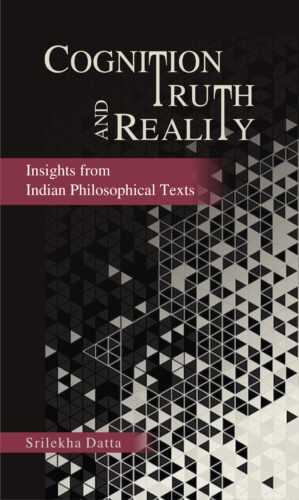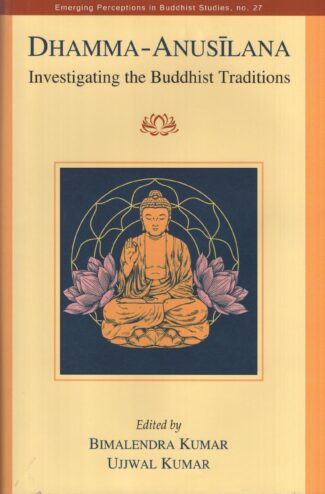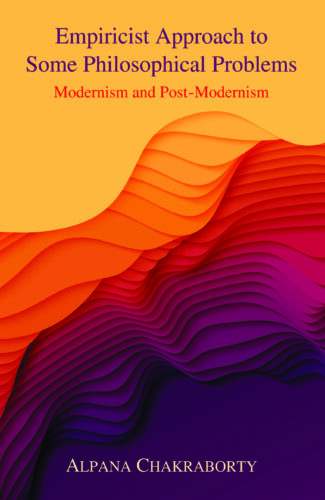Showing 11–20 of 66 results
Chinese philosophy is highly unique in its profound sense of moral thinking. The fundamental thesis of Chinese thinking is interdependence and mutual relationships between entities, human and natural. For great thinkers like Confucius and Lao zi a human being is a relatively constituted and situated self. What is important in social living is correlative thinking and resonance, complementary approach to differences, action guiding nature of judgment and the effective appropriation of naturalness and spontaneity in the interrelations between individuals, human beings and nature. The book is a prelude to study the significance of personal excellence and social harmony embedded in Chinese philosophical tradition.

The book addresses various fundamental topics of philosophy in the area of epistemology and metaphysics like doubt, memory, perception, truth and validity, the self, consciousness and universals; and these are explored from the perspective of Indian philosophy.
“This book contains a number of essays on various fundamental topics of philosophy in the area of epistemology and metaphysics. Topics like doubt, memory, perception, truth and validity, the self, consciousness and universals are explored from the perspective of Indian philosophy. The discussion here is based on Indian philosophical texts which bear the evidence of analytical mind of the Indian thinkers and their critical approach to the subject. The author has suggested some new interpretation in some cases and offered some alternative solution to certain problems. These essays are the results of the author’s intensive study of the subject. This book will be useful for students and researchers. A survey of the opinions of different schools of philosophy on different topics can be found here and the scope for further research on those areas has also been shown.”
The aim of this book is to achieve a proper theoretical understanding of democracy through philosophical explorations. By these explorations we want to reach some unitary decision on at least three things. The first one involves the concept of democracy. The next one is concerned with the purpose of democracy. The final one is concerned with what is necessary for ensuring and developing democracy in a state or society in the absence of which democracy gets threatened. We will explore and analyze the interconnections between these three dynamics.
Jain, Bauddha and Ajivaka belong to Sramanic tradition. Ajivakas were firm believers of determinism (Niyativada). Determinism, in philosophy, implies that all events, including moral choices, are completely determined by previously existing causes. But when we talk about niyati as per Jain perspectives, there is a doctrine of karma. According to karma theory, an individual’s present condition is determined not by any absolute principle but by his own actions performed either in his past lives or in this life. By freely choosing the right course and following it faithfully, he could improve his destiny and ultimately win salvation.
But Jainism does not totally reject the doctrine of Niyativada. It talks of five co-factors (panca-samavaya), i.e. kala, svabhava, niyati, purvakrta and purusa. The first cause of the universe is false when each of the five factors is taken singly but true when they are considered jointly. Buddhist text Digha Nikaya talks of two types: (1) Theistic determinism (2) Karmic determinism. However, Buddha does not teach that we have complete freedom or that we are determined, but that our will is conditioned or limited to a greater or lesser extent.
This volume contains ten selected papers that present the philosophical discussion on determinism in Srmananic traditions, particularly in Jainism.

This book is an anthology of seventeen cerebral articles from well-known Buddhist scholars associated with major universities across the globe deliberating many a topic associated with Buddhist religion and its philosophies as part of our constant striving to understand the fundamental nature of what the Buddha wanted us to realize.
There have been serious attempts to understand the Buddha and his teachings since the inception of Buddhism some 2,600 years ago. All through the history of Buddhism, scholars were constantly striving to understand the fundamental nature of what the Buddha wanted us to realize. This book is an anthology of seventeen cerebral articles from well-known Buddhist scholars associated with major universities across the globe. In four parts – Meditation; Personality and Position; Dharmakirti and Persons; and Principles, History and Grammar – it highlights some pertinent topics associated with Buddhism and its legacy.
Part I discusses the diverse dimensions of meditation, dedicating itself to the kiriya (action) aspects of Buddhism. Part II is an attempt to delineate and study the major branches of Buddhism. Part III deliberates on the contributions of Dharmakirti and Rahula Sankrtyayana to the Buddhist philosophy along with the concept manusa-panatipata and how the revelation of reality of human experience by analysis helps a person to achieve wisdom in the light of Majjhima Nikaya Anathapindikovadasutta. Part IV has papers on different philosophical and applied concepts of Buddhism.
This volume thus should benefit one in understanding many an aspect of Buddhism vis-à-vis its enormous corpus of literature and teachings. It should highly benefit the students of Buddhism and for those who are keen to fathom deep into the myriad topics of Buddhist philosophy and teachings.
This book presents a proper meaning of the Ramcharitmanas chaupai, Dhola gamvara sudra pasu nari , ye sab tadana ke adhikari using the actual meaning of the word, tadana, in Avadhi language, and by delving into the deep philosophical references of the Pancabhutas, ether, air, fire, water, and earth of the Samkhya and
Vaishesika darshanas, as intended by Goswami Tulsidas.
DRISHTIPAAT, is a glimpse into the life and times of the three great saints of Ishvar Ashram, Nishat, Srinagar Kashmir. This book makes their presence felt all around us. The pictorial journey, takes the reader, in the serene and benign presence of the great Shaiva master Shree Lakshman Joo, Devi Sharika Ji and Devi Prabha Ji. Their drishti (glance), through the pictures, and shlokas make readers drench with the Divine Grace and their blessings.
Philosophy in this set of two volumes is a cognitive activity par excellence. Cognition is that the language expresses and it reveals intelligible objects/beings of language and the meaning to which our philosophical reflections, investigations, analysis and interpretation are not only based on but are confined to. The work is fit for satisfying the intellectual hunger of those who are sick of reading the same metaphysical, ontological, theological and epistemological descriptions in different books of history of philosophy, Indian and Western, to those searching a philosophy free from our captive thinking and also an innovative vision to meet out the new challenges in philosophy. Concentrating on cognition as it flashes by language the book analyses, discusses, interprets and critically argues most of the philosophical issues and their responses by Indian and Western philosophical traditions well conclusively.
Unlike linguistic and analytic philosophies, the book is a philosophy of language. Unlike meaning-centric philosophies popular in the East and West, the language-centric approach of the book is based on the expressive nature of language. Based on cognition as it flashes, on active theory of knowledge and action-oriented view of language and its meaning, it reflects on problems, doubts, paradoxes and queries for clarity and resolve, and on that basis, utility and future of philosophy as well.
Against philosophy as subjective and objective thinking, it is a cognitive reflection par excellence. These volumes cover the courses of philosophy prescribed in the universities and colleges useful for scholars and students and those who want a fresh perception to come up with the new challenges in philosophy.

The book carefully examines and analyses the empirical tradition from different angles and concludes that modern and post-modern philosophy is actually a development from rationalism to empiricism, from the viewpoint of Francis Bacon, Thomas Hobbes, John Locke, George Berkeley, David Hume, John Stuart Mill, Edmund Husserl, Bertrand Russell and Ludwig Wittgenstein.
“This book is an attempt to give a historical account of the development of the empirical thoughts. It discusses issues related to the sources and the methods of knowing and highlights the views of the prominent empirical philosophers such as Thomas Hobbes and Francis Bacon up to Wittgenstein and the logical positivists. It takes up the issues related to the universals and inquires “Is there anything that is universal?” and if so, “Is universe knowable?”. The nominalist views of Thomas Hobbes and John Locke are taken up to establish the empiricist claim that “universals cannot exist without the particulars”. The important question “How do we determine the criteria of personal identity?” is taken up by John Locke and David Hume. Locke’s view that, “it is the same consciousness which constitutes personal identity”, but Hume rejects the idea of the permanent self. The criticisms for and against Locke and Hume are discussed herein in detail. The Berkeleian idealistic position that “only ideas of the mind are real” and the phenomenalistic position of Kant that “sense perception exists even when the object is not present in front of the perceivers eye” have both supportive and counter arguments which are discussed in detail. A critical analysis of Kantian theory of knowledge with the help of the two dogmas of empiricism has also been discussed.”
This is an annotated English translation of Vijñānabhikṣu’s commentaries on the first five Brahmasūtra (BS) of Bādarāyaṇa called the Vijñānāmṛtabhāṣya (VijBh). This is a pioneering work as no translation of the VijBh has been done so far. Bhikṣu is perhaps the only known Vedānta scholar who has argued for Brahman along with his prakṛti-śakti being the cause of the world. He calls his Advaita philosophy as Avibhāga-Advaita and sets himself against Śaṅkara’s Advaita which argues for Brahman alone being the material and efficient cause of the world. Bhikṣu is also an unique Advaita scholar as he interprets Vedānta using Sāṁkhya/Yoga principles. One of the reasons for choosing to comment on only the first five sūtras was because the VijBh is a huge work and also because Bhikṣu’s Avibhāga-Advaita can easily be understood from his commentaries on these first five sūtras of the BS. Even though the real reason for Bhikṣu’s commentary on the fifth sūtra (BS I.1.5) should be clear to anyone familiar with Vedānta’s objection to prakṛti being the cause of the world, it needed to be seen as to how Bhikṣu, as a committed Sāṁkhya-Yoga-Vedāntācārya, defends prakṛti’s role in being the cause. Just as writing commentaries on the first four sūtras of Śaṅkara’s BSBh done by some eminent scholars present the main features of Śaṅkara’s Advaita, the commentaries on the first five sūtras of the BS by Bhikṣu could adequately present Bhikṣu’s Avibhāga-Advaita Vedānta.
| There are no products |